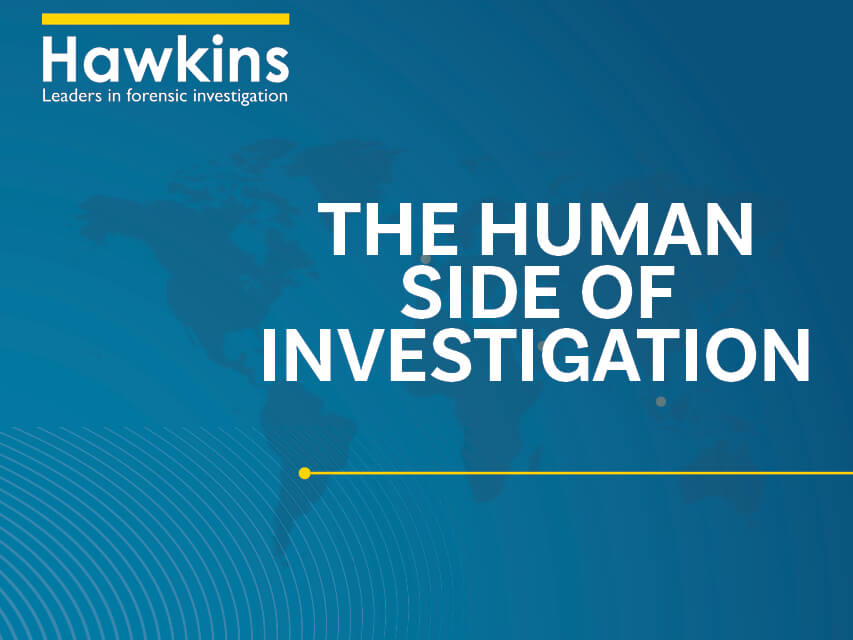In this article, we revisit the world of fire investigations through the eyes of Simon Vallance. Simon shared his insights from his experience as a forensic investigator before he decided to leave Hawkins in 2020 to pursue a new career.
Taking a Look Back: Investigator Insights
When I joined Hawkins, I was both nervous and excited about starting a career in fire investigation. I discovered it as a possible career path whilst studying for my chemistry degree, and thought it would be a nice marriage of problem-solving and science. I remember my first visit to a house that had been involved in a fire, and can recall the sheer scale of damage that had occurred as the result of a small electrical fire in a cupboard. I was shadowing another Hawkins investigator, who let me spend the time on scene walking around the house, soaking up the atmosphere, examining how the fire had spread and looking at how different materials had been affected. Ultimately, as an investigator, the job is about discovering the cause of a fire to assist an insurer; but as a human being, it is not quite so black and white. It is not until you start going to scenes, and start speaking to individuals who are directly affected by disasters, that you see the more empathetic side of the job.
As my career has progressed, I have come to realise more and more that discovering why only forms part of the investigation. As well as the physical evidence we examine, fire investigators also interact with witnesses and people directly affected by disasters. We meet people from all walks of life, from all backgrounds and cultures, and all of them are unique. Sometimes those you expect to be strong, cry on your shoulder, and others who have lost everything are full of hope. There is a lot of pressure on you as an individual to solve the case, not only because it is why you have been instructed by your principals, but because it can be very important to someone who has lost something or somebody as a result of the incident.
As part of our role we have to ask questions, often difficult ones, which pertain to a disaster. These answers about memories, circumstances and whereabouts on the day of a fire can be challenging for individuals to relive, and an element of care must always be taken when speaking with people. Showing your compassionate side allows you as an investigator to obtain hopefully a more credible and honest account of what has happened. Whilst it is a catharsis for the people concerned, it is also provides integral evidence to help the investigator do their job. A lot of the time, when I am talking casually with someone after my routine questions, I end up obtaining crucial information that people may not remember or think to mention in a more traditional interview situation. However, people also have the ability to ask you some questions too. As an investigator, you are looked at as the person who is going to solve the problem and hopefully give someone closure after a loss, it is lovely when people thank you for helping them get through something.
Although we can often provide this closure, it is not always possible if the probable cause of an incident is unable to be established. This can add to the pressure or stress of the investigation, because the individual is expecting you to identify the cause. Furthermore, the stress on the investigator can also be greater if they identify that the cause of the incident, though clearly accidental, was down to an error made by the individual (e.g. carelessly discarded smoker’s materials). This can be exacerbated if the incident led to the loss of something particularly important. On occasions such as this, we may need to be guarded on how we share information, so that we can protect that individual’s feelings.
When you have been doing a job of this nature for a long time, it is easy to either feel some emotional attachment to each investigation (which can be difficult to deal with regularly), or alternatively, become numb to others’ feelings and losses, as you focus solely on the technical aspects of the job. There can be a lot of pressure when a case hinges on your investigation. Whilst every possible cause must be explored, and all of our work must be extremely thorough, each investigation must also be approached with care, compassion and understanding. A big part of taking care of one’s mental health is letting go of the idea that you can predict or control the future, and yet, this is a job where you must be very in control.
Remember, if you had suffered a loss, how would you like to be treated? Though Hawkins investigators can come from firefighting, police or other industry backgrounds where losses are prevalent and common, we are all human. The importance of making time for people, including yourself, should not be underestimated. Sometimes you are standing in the middle of a burnt out fish & chip shop and you have to kindly explain to a disappointed customer that it is definitely not still open. Sometimes you speak to people who have lost a loved one in a fire and they are the same age as your friends or family. It is one thing to be able to get through the investigation of an isolated incident, but when you are dealing with incident after incident, you have to be prepared for a range of emotions, and this can take a toll on you.
It is, therefore, important to remember to look after ourselves. As investigators of fires and other losses, we are continually exposed to tragedy, and this can slowly erode your mental condition, such that you might not notice a problem until it is too late. I recently took a course on Mental Health First Aid, which covered the subject of how people perceive mental health. I was shocked at some of the statistics regarding the fact that, in this enlightened time, so many people still do not understand what mental health is, and also that many are unwilling to work with individuals with mental health difficulties. Individuals with mental health conditions are often more stable than people think. They are also often more aware of their own fragility, as well as the fragility of others.
Hawkins would like to remind everyone to look after their mental well-being. Good mental health is as important as physical health. It is of paramount importance that you check in on yourself frequently and, if you feel you can, talk to colleagues or friends about it. Discuss a particularly difficult investigation or vent about how something made you angry with people who will listen and support you. Young or old, we are all susceptible.






